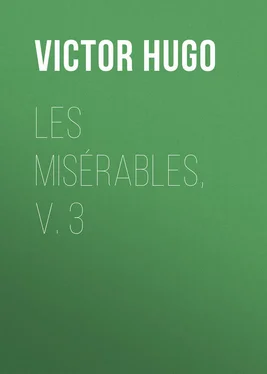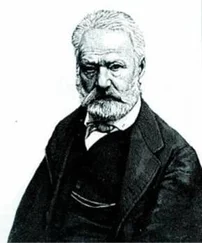Victor Hugo - Les Misérables, v. 3
Здесь есть возможность читать онлайн «Victor Hugo - Les Misérables, v. 3» — ознакомительный отрывок электронной книги совершенно бесплатно, а после прочтения отрывка купить полную версию. В некоторых случаях можно слушать аудио, скачать через торрент в формате fb2 и присутствует краткое содержание. Жанр: literature_19, foreign_antique, foreign_prose, на английском языке. Описание произведения, (предисловие) а так же отзывы посетителей доступны на портале библиотеки ЛибКат.
- Название:Les Misérables, v. 3
- Автор:
- Жанр:
- Год:неизвестен
- ISBN:нет данных
- Рейтинг книги:4 / 5. Голосов: 1
-
Избранное:Добавить в избранное
- Отзывы:
-
Ваша оценка:
- 80
- 1
- 2
- 3
- 4
- 5
Les Misérables, v. 3: краткое содержание, описание и аннотация
Предлагаем к чтению аннотацию, описание, краткое содержание или предисловие (зависит от того, что написал сам автор книги «Les Misérables, v. 3»). Если вы не нашли необходимую информацию о книге — напишите в комментариях, мы постараемся отыскать её.
Les Misérables, v. 3 — читать онлайн ознакомительный отрывок
Ниже представлен текст книги, разбитый по страницам. Система сохранения места последней прочитанной страницы, позволяет с удобством читать онлайн бесплатно книгу «Les Misérables, v. 3», без необходимости каждый раз заново искать на чём Вы остановились. Поставьте закладку, и сможете в любой момент перейти на страницу, на которой закончили чтение.
Интервал:
Закладка:
It was the essence and quintessence of white Parisian society, and reputations, even Royalist ones, were kept in quarantine there, for there is always anarchy in reputation. Had Chateaubriand come in he would have produced the effect of Père Duchêne. Some converts, however, entered this orthodox society through a spirit of toleration. Thus the Comte Beug – was admitted for the purpose of correction. The "noble" salons of the present day in no way resemble the one which I am describing, for the Royalists of to-day, let us say it in their praise, are demagogues. At Madame de T – 's the society was superior, and the taste exquisite and haughty beneath a grand bloom of politeness. The habits there displayed all sorts of involuntary refinement, which was the ancient régime itself, which lived though interred. Some of these habits, especially in conversation, seemed whimsical, and superficial persons would have taken for provincialism what was merely antiquated. They called a lady "Madame la Générale," and "Madame la Colonelle" had not entirely been laid aside. The charming Madame de Léon, doubtless remembering the Duchesses de Longueville and de Chevreuse, preferred that appellation to her title of Princess, and the Marquise de Créquy was also called "Madame la Colonelle."
It was this small high society which invented at the Tuileries the refinement of always speaking of the King in the third person, and never saying, "Your Majesty," as that qualification had been "sullied by the usurper." Facts and men were judged there, and the age was ridiculed – which saved the trouble of comprehending it. They assisted one another in amazement, and communicated mutually the amount of enlightenment they possessed. Methusalem instructed Epimenides, – the deaf put the blind straight. The time which had elapsed since Coblenz was declared not to have passed, and in the same way as Louis XVIII. was Dei gratia in the twenty-fifth year of his reign, the émigrés were de jure in the twenty-fifth year of their adolescence.
Everything harmonized there: no one was too lively, the speech was like a breath, and the newspapers, in accordance with the salon, seemed a papyrus. The liveries in the ante-room were old, and these personages who had completely passed away were served by footmen of the same character. All this had the air of having lived a long time and obstinately struggling against the tomb. To Conserve, Conservation, Conservative, represented nearly their entire dictionary, and "to be in good odor" was the point. There were really aromatics in the opinions of these venerable groups, and their ideas smelt of vervain. It was a mummy world, in which the masters were embalmed and the servants stuffed. A worthy old Marchioness, ruined by the emigration, who had only one woman-servant left, continued to say, "My people."
What did they do in Madame de T – 's salon? They were ultra. This remark, though what it represent has possibly not disappeared, has no meaning at the present day, so let us explain it To be ultra is going beyond; it is attacking the sceptre in the name of the throne and the mitre in the name of the altar; it is mismanaging the affair you have in hand; it is kicking over the traces; it is disputing with the executioner about the degree of roasting which heretics should undergo; it is reproaching the idol for its want of idolatry; it is insulting through excess of respect; it is finding in the Pope insufficient Papism, in the King too little royalty, and too much light in the night; it is being dissatisfied with alabaster, snow, the swan, and the lily, on behalf of whiteness; it is being a partisan of things to such a pitch that you become their enemy; it is being so strong for, that you become against.
The ultra spirit specially characterizes the first phase of the Restoration. Nothing in history ever resembled that quarter of an hour which begins in 1814 and terminates in 1820, with the accession of M. de Villèle, the practical man of the Right. These six years were an extraordinary moment, at once noisy and silent, silent and gloomy, enlightened, as it were, by a beam of dawn, and covered, at the same time, by the darkness of the great catastrophe which still filled the horizon, and was slowly sinking into the past. There was in this light and this shadow an old society and a new society, buffoon and melancholy, juvenile and senile, and rubbing its eyes, for nothing is so like a re-awaking as a return. There were groups that regarded France angrily and which France regarded ironically; the streets full of honest old Marquis-owls, returned and returning, "ci-devants," stupefied by everything; brave and noble gentlemen smiling at being in France and also weeping at it, ravished at seeing their country again, and in despair at not finding their monarchy; the nobility of the Crusades spitting on the nobility of the Empire, that is to say, of the sword; historic races that had lost all feeling of history; the sons of the companions of Charlemagne disdaining the companions of Napoleon. The swords, as we have said, hurled insults at one another; the sword of Fontenoy was ridiculous, and only a bar of rusty iron; the sword of Marengo was odious, and only a sabre. The olden times misunderstood yesterday, and no one had a feeling of what is great or what is ridiculous. Some one was found to call Bonaparte Scapin. This world no longer exists, and nothing connected with it, let us repeat, remains at the present day. When we draw out of it some figure hap-hazard, and try to bring it to bear again mentally, it seems to us as strange as the antediluvian world; and, in fact, it was also swallowed up by a deluge and disappeared under two revolutions. What waves ideas are! How quickly do they cover whatever they have a mission to destroy and bury, and how promptly do they produce unknown depths!
Such was the physiognomy of the salon in those distant and candid days when M. Martainville had more wit than Voltaire. These salons had a literature and politics of their own: people in them believed in Fiévée, and M. Agier laid down the law there. M. Colnet, the publisher and bookseller of the Quai Malaquais, was commented on, and Napoleon was fully the ogre of Corsica there. At a later date the introduction into history of M. le Marquis de Buonaparté, Lieutenant-General of the armies of the King, was a concession to the spirit of the age. These salons did not long remain pure, and in 1818 a few doctrinaires, a very alarming tinge, began to culminate in them. In matters of which the ultras were very proud, the doctrinaires were somewhat ashamed; they had wit, they had silence, their political dogma was properly starched with hauteur, and they must succeed. They carried white neck-cloths and buttoned coats to an excessive length, though it was useful. The fault or misfortune of the doctrinaire party was in creating old youth: they assumed the posture of sages, and dreamed of grafting a temperate power upon the absolute and excessive principle. They opposed, and at times with rare sense, demolishing liberalism by conservative liberalism; and they might be heard saying: "Have mercy on Royalism, for it has rendered more than one service. It brought back traditions, worship, religion, and respect. It is faithful, true, chivalrous, loving, and devoted, and has blended, though reluctantly, the secular grandeurs of the Monarchy with the new grandeurs of the nation. It is wrong in not understanding the Revolution, the Empire, glory, liberty, young ideas, young generations, and the age; but do we not sometimes act quite as wrongly against it? The Revolution of which we are the heirs ought to be on good terms with everything. Attacking the Royalists is the contrary of liberalism; what a fault and what blindness! Revolutionary France fails in its respect to historic France; that is to say, to its mother, to itself. After September 5th, the nobility of the Monarchy were treated like the nobility of the Empire after July 8th; they were unjust to the eagle and we are unjust to the fleur-de-lys . There must be, then, always something to proscribe! Is it very useful to ungild the crown of Louis XIV., and scratch off the escutcheon of Henri IV.? We sneer at M. de Vaublanc, who effaced the N's from the bridge of Jena; but he only did what we are doing. Bouvines belongs to us as much as Marengo, and the fleur-de-lys are ours, like the N's. They constitute our patrimony; then why should we diminish it? The country must be no more denied in the past than in the present; why should we not have a grudge with the whole of history? Why should we not love the whole of France?" It was thus that the doctrinaires criticised and protected the Royalists, who were dissatisfied at being criticised, and furious at being protected.
Читать дальшеИнтервал:
Закладка:
Похожие книги на «Les Misérables, v. 3»
Представляем Вашему вниманию похожие книги на «Les Misérables, v. 3» списком для выбора. Мы отобрали схожую по названию и смыслу литературу в надежде предоставить читателям больше вариантов отыскать новые, интересные, ещё непрочитанные произведения.
Обсуждение, отзывы о книге «Les Misérables, v. 3» и просто собственные мнения читателей. Оставьте ваши комментарии, напишите, что Вы думаете о произведении, его смысле или главных героях. Укажите что конкретно понравилось, а что нет, и почему Вы так считаете.












